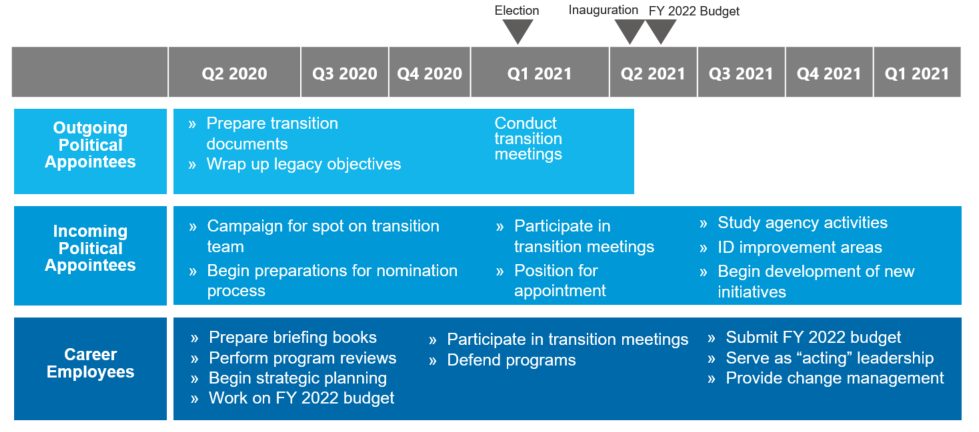2020-21 Administration Transition Prompts Recommendations for Change
Published: December 17, 2020
A recent hearing with the House Committee on Oversight and Reform discussed several recommendations for a smoother presidential changeover the next time around.
Key Takeaways:
- Complications arising in the 2020 presidential election and transition have prompted members of Congress and think tank groups to examine and restructure future transitions.
- Transition recommendations include amending the Presidential Transitions Act with clearer guidance for GSA ascertainment, dismantling the Schedule F executive order, and proposing legislation to mitigate “midnight” rulemaking.
The task of transitioning the management of the entire federal government from one presidential administration to another is, understandably so, daunting and intricate. Preparation for the change in a U.S. president occurs long before Election Day and does not quite get the fanfare it deserves for its complexity:
The Presidential Transitions Act of 1963 outlines the processes presidential candidates and incoming administrations must undergo to establish a smooth transfer of power. In particular, the law addresses three main facets of a transition: require eligible presidential candidates to establish transition-related organization structure; authorize funding for office space, staff and other transition activities; and outline the process presidential candidates can designate and start vetting candidates to fill important top spots in the new administration.
Since its inception, the law underwent four major amendments to address lessons learned from previous transitions. The 2020-21 transition is proving that additional amendments may be in the works.
One action prompting review on presidential transitions is Trump’s recent executive order, “Creating Schedule F in the Excepted Service.” The EO stipulates that agency heads can reclassify certain policy-making or advocating positions to excepted service position. Among other concerns, the order potentially allows current administration appointees to “burrow in” agencies.
Yet the largest obstacle, thus far, in the ongoing transition has been GSA’s delay in releasing resources to President-elect Biden, pinning the delay on legally contested results of the 2020 Election. The transition time between Election Day and Inauguration day is a critical one as new administrations use the time to identify key White House staff and agency leadership, deploy agency review teams to visit agencies, establish connections with domestic and foreign leaders, and build policy and management agendas. Normally, the president-elect has an average of 75 days in the post-election period, however, the time was cut to 57 days for the Biden Administration.
The delay in receiving such resources, particularly during a global pandemic and nationwide economic recovery period, could hinder the new administration in receiving critical briefings and agency updates in ongoing U.S. situations.
Because of these activities, the House Committee on Oversight and Reform called a hearing to “examine ways to amend the Presidential Transition Act to put clearer guiderails on what it means to “ascertain” the “apparent successful candidate for the office of president and vice-president” and prevent any future attempts to scuttle an orderly transfer of power. We will also examine at this hearing the role of Congress during the lame duck period. We have a responsibility to ensure that this administration does not place political appointees who lack qualifying expertise into the competitive civil service, promulgate so-called last minute midnight regulations, or fail to properly collect, retain, and preserve presidential or federal records,” according to Subcommittee Chairman Gerry Connolly's opening statement.
At the hearing, Connolly introduced the Midnight Regulations Review Act. The proposed legislation would require the GAO to create a list of regulations created by the outgoing administration during its lame duck period, and allow Congress and the incoming administration to determine validity of the regulations based on evidence and research.
Additional recommendations at the hearing, primarily put forth by Max Stier from the Partnership for Public Service include:
- Block implementation of Trump’s Schedule F executive order through congressional action
- Clarify the standard for ascertainment by GSA of the apparent winner of the presidential election
- Provide earlier transition support
- Prepare appointees and hold them accountable
- Reduce the number of appointees and Senate-confirmed positions
- Update paperwork and security clearance processes for appointees
- Create an online, searchable and regularly updated Plum Book
- Guard against improper burrowing
- Update the Federal Vacancies Reform Act to include timelines for vacancy reporting and fill positions in an acting capacity by other IG officials
- Help shape the next management agenda
